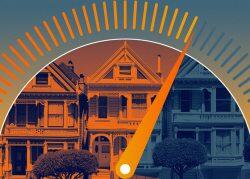East Bay home prices dropped 22 percent between April and July, according to a new report by Compass.
Single-family homes hit their highest value in April at $1.4 million. They maintained that level through May and started falling in June.
But the Federal Reserve’s interest rate increases, coupled with already high homes prices, pushed prices lower, according to Patrick Carlisle, Compass’ chief market analyst.
“The huge surge in interest rates, added to the highest home prices ever, have made the cost of housing soar,” he said in an email to TRD. “Besides the double whammy of interest rates + home prices, the general economic uncertainty of highly volatile stock markets (though they’ve rebounded in the past month), inflation (dropped a little in the past month), and consumer confidence have affected the market.”
The average sale price in the East Bay for July was $1.23 million, which is lower than its Bay Area counterparts. The average sale price in San Francisco and Santa Clara County was $1.7 million. Prices have fallen by 20 percent in San Francisco and 10 percent in Santa Clara.
The condo market also saw a peak in April this year, with median sales of $655,000. That was just below the pandemic high of $670,000 durch March 2020. By July, condo sales had decreased 5 percent to $625,000.
According to Carlisle, the first homes to be hit were lower-priced ones in March and April when interest rates soared. As the stock market took a hit in May, higher priced homes saw prices start to fall. July saw all homes follow a similar trend with a decrease in asking and sales prices.
The end of summer typically is a slow period for the residential market, with the start of fall bringing a spike of new listings before cooling off again before Thanksgiving. The question is whether this year will follow a regular trajectory, or the market will still need to recover from challenges earlier in the year.
“Will we see a spike in new listings or will sellers hold off due to continuing economic uncertainty? And if we see a spike, how will buyers react to the surge in new listings?” Carlisle asked. “That will be the next test of the market, and I can’t predict what is going to happen. There are a lot of economic plates spinning right now.”
Read more

